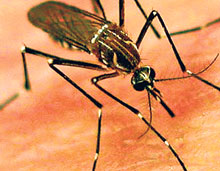SINGAPORE, Dec 4 (Reuters) - Experts have warned that treating dengue, a potentially fatal disease caused by a mosquito-borne virus, will become more difficult in the future as more people around the world become overweight and obese.
Dengue patients suffer from capillary permeability, when fluid leaks from their blood vessels into surrounding tissues, causing breathing difficulty and complications in major organs like the brain, liver and kidneys.
 |
| The dengue mosquito: There is currently no cure or vaccine for dengue |
"The virus has an impact on the wall of the capillaries and allows more fluids to leave the tubes and into the tissues," said Jeremy Farrar, tropical medicine professor and director of the Oxford University Clinical Research Unit in Vietnam.
"The complications are lots of fluids in the lungs which make breathing difficult. In people who have a high BMI (body mass index), their capillaries are intrinsically more likely to leak, so that is made worse in a dengue infection," Farrar told Reuters after addressing an infectious disease conference in Singapore.
Dengue used to be a disease primarily among young children, but almost anyone is now susceptible and infection numbers have shot up because of urbanisation and the constant movement of people -- conditions that allow the Aedes aegypti mosquito, which carries the virus, to thrive.
The World Health Organisation estimates there are 50 million dengue infections worldwide each year. Among these are 500,000 severe cases -- what is known as dengue haemorrhagic fever (DHF). There are about 22,000 deaths annually, mainly among children.
Dengue is expensive, costing an average of US$1,394 for every hospitalised patient. At least 10 working days are lost in each case. About 2.5 billion people live in more than 100 endemic countries and areas where dengue viruses can be transmitted.
There is currently no cure or vaccine for dengue, although Sanofi-Aventis SA has a candidate vaccine in the final stage of clinical development.
Lam Sai Kit, a virologist and emeritus professor at the University of Malaysia, called for better surveillance of the disease and its burden so that funds may be made available when a vaccine is finally available.
"People must monitor the situation properly otherwise you never realise the severity of the problem or the disease burden," said Lam, who is also chairman of Dengue v2V, an independent expert panel that lobbies for better management of the disease.
"Unless you are aware it is a problem and back it up with statistics, there is no way the government will consider (paying for) vaccination," Lam said in another media event. |


